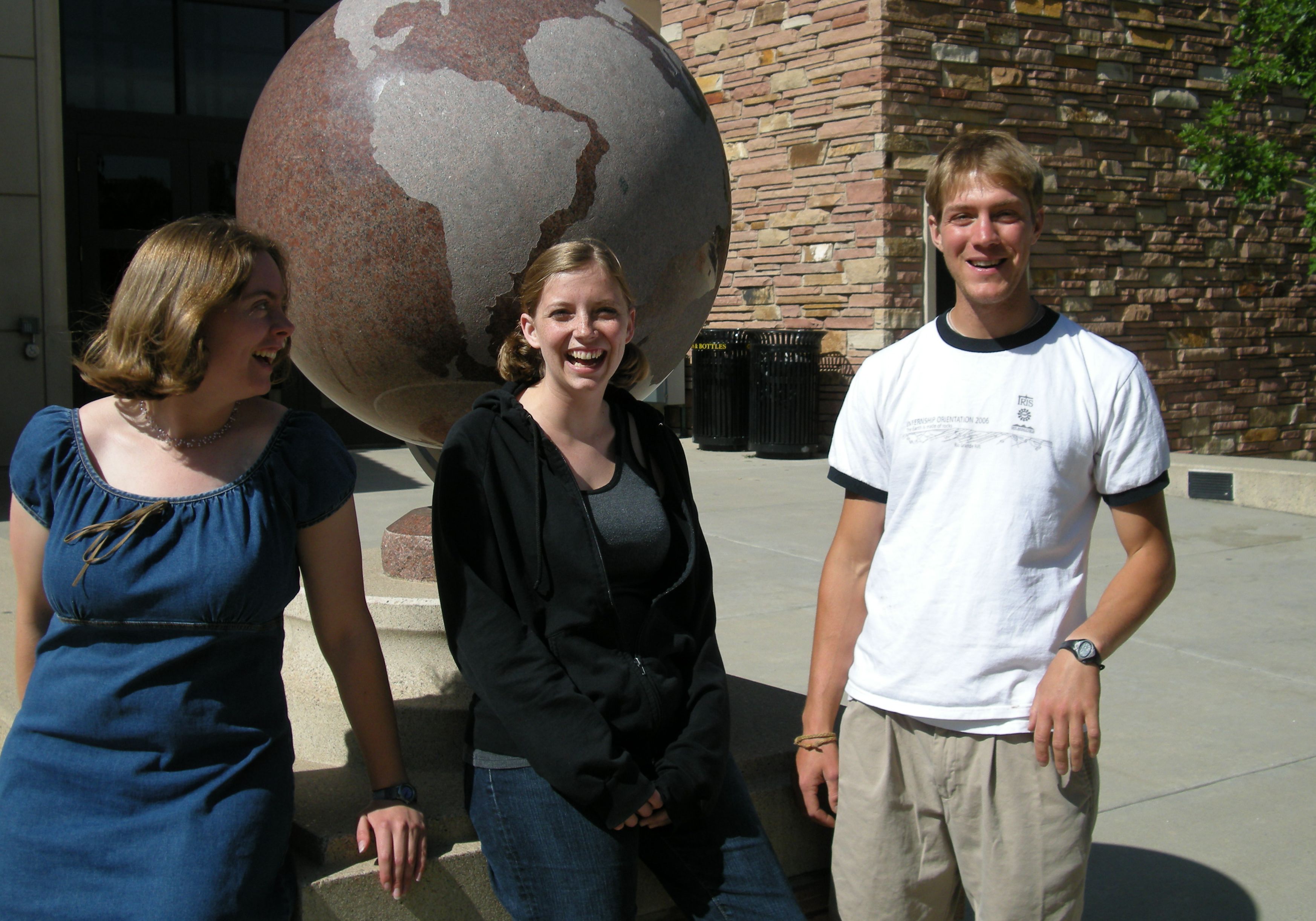Host Site and Staying Connected
 Following the orientation, students travel to their internship site to meet their mentor and conduct their summer research. Student research projects are developed according to criteria defined by the internship program, and result in carefully constructed plans by IRIS members. While projects vary with regards to exact research topics, all projects involve seismic data and provide interns with ample opportunities to:
Following the orientation, students travel to their internship site to meet their mentor and conduct their summer research. Student research projects are developed according to criteria defined by the internship program, and result in carefully constructed plans by IRIS members. While projects vary with regards to exact research topics, all projects involve seismic data and provide interns with ample opportunities to:
- develop an understanding of scientific inquiry, including designing and conducting scientific investigations and defending scientific arguments,
- gather, manage, and convey information, using various skills, strategies, resources, and
- learn, use, and evaluate technologies for the collection and study of geophysical data, while working with a researcher at an IRIS institution.
Interns’ progress towards the development of these core research skills and their specific research project will be monitored during regular meetings with their mentor. Regular mentoring of interns remains the critical component that enables students to successfully navigate their research. To facilitate this process and encourage mentoring conversations that are focused on intern growth our program has developed a self-reflection mentoring rubric that is used at the beginning, middle and end of the summer. Mentors are also encouraged to formally assign interns a graduate student as an additional mentor as well.
An important benefit of the longevity of this internship program is the depth of the community it has created and the resulting exchange of experiences between participants in different years. In several cases, the longevity of the program has resulted in a graduate mentor who was an alumnus of the IRIS internship program. Such parings not only prove positive for the intern, but also provide a structured opportunity for graduate students within the IRIS consortium to gain experience mentoring early in their careers. For example, in the image at right, three generations of IRIS interns work with Anne Sheehan at the University of Colorado, Boulder. Arianne Dean - 2007, Mollie Pettit - 2008, Will Levandowski - 2006 for the summer of 2008. Hosts are also encouraged to regularly review interns’ blog posts as tool to gain insights into interns’ current thinking and development.
The rubric reminds "the adviser that its not all about cranking out their research, but also about developing the intern's career path". (2012 Mentor)
About the Mentors
The IRIS Consortium includes nearly every university conducting seismological research in the US. Thus, IRIS’s potential mentor pool includes many of the most prestigious academic institutions and nearly every academic seismologist, with interests and research that represents the spectrum of specialties within seismology. As a result, a wide range of seismological facilities and expertise are available to the interns through the IRIS Undergraduate Internship Program.
Annually, IRIS invites the faculty at its member institutions to submit a proposal to host an intern for the summer. The host proposal process requires each researcher to describe the scientific goals of the project, the role and probable activities of the intern, a written mentoring plan containing acheivable goals for each third of the summer. This competitive process for hosts ensures that each summer we are able to offer highly engaging projects with motivated faculty that are interested and engaged in the growth of undergraduate students. To help ensure high-quality mentoring the program has created a collection of resources available through the internship website to help mentors prepare for the arrival of their interns.
Staying Connected with Other the Interns
Because the IRIS Consortium has a national membership, IRIS interns are distributed across the US each summer to conduct their research. Thus, a chanllenge for the program has been to develop a model for building Virtual Cohorts. As part of this model IRIS has built a cyber-infrastructure to help interns maintain contact with one another, the alumni mentor, and with the program facilitator. This infrastructure features a variety of modern e-communication tools.
Blogs
The use of blogs is a primary component of the cyber infrastructure that enables the interns to remain connected as a cohort throughout the summer. A blog is a web-based tool that helps publish posts consisting of usually short, frequently updated text, photos or other files that are arranged chronologically. This information is uploaded instantly without the need for software or the writing of html code. In addition to allowing interns to share their thoughts and work, blogs also allow two-way communication among interns through a commenting feature. According to Pyra Labs, developers of [url=http://www.blogger.com]http://www.blogger.com[/url] and blogger technology, “Blogs help small groups communicate in a way that is simpler and easier to follow than email or discussion forum. A blog can help keep everyone in the loop, promote cohesiveness and group culture, and provide an informal "voice" of a project or department to outsiders.”
In addition to connecting students, blogs also support the program's goal of enhancing interns' ability to self-monitor their own progress. This requires the conscious development of metacognition, a higher order thinking skill that involves active control over the cognitive processes engaged in learning. Often it is simplified to thinking about one’s own thinking and includes planning how to approach a given learning task, monitoring comprehension, and evaluating progress toward the completion of a task. The development of students’ metacognitive skills is an important aspect of the blogs. Here interns are encouraged to describe their projects in their own words, identify and structure overarching and periodic goals, monitor and evaluate progress, as well as discuss the broader reaches of their work.
“(The blog) helped me not only keep track of what I was doing for the summer, but also how to keep a record of my progress in general.”
“…. the process of sitting down, writing, and telling a narrative helped make ideas more concrete in my head.”
Discussion Forums
Recognizing that for a variety of reasons, including fostering the cohort experience, it is worthwhile to provide a means of communication among the interns that is asynchronous and not publicly visible. To serve this niche, the IRIS cyber-infrastructure provides an “Intern Lounge.” The Intern Lounge is a password-protected online discussion board that creates a space outside the traditional mentor relationship for interns “safely” ask questions, share their experiences, and offer suggestions or assistance to other interns. Given that intensive field work that is also associated with the students summer research, an additional advantage of discussion forums is that it allows the conversation can occur at a time that is convenient for the intern e.g. evenings when returing to a hotel, on lunch breaks etc.
Recently, we have embraced a private Facebook group as a replacement to the discussion forum discussed above. Prior to the start of the REU program, interns are invited to join a private Facebook group to encourage social interactions and help interns prepare for their upcoming experiences. This group is then maintained and encouraged throughout the summer and beyond by posts from the alumni mentor.
We chose to use this tool for a number of reasons. First, it is a place that most interns already have a presence and a "virtual" persona. As a result they generally check Facebook often and are used to having conversations with friends. Second, Facebook allows students to "friend" each other. Not only does this allow person to person interaction during the summer, it is a great aid in keeping in the cohort in contact well after the summer experience is over. Third, Facebook is a robust technology. Facebook offers both group and person-to-person, and synchronous and asynchronous methods of communications for users. Facebook also has both mobile and website interfaces that keep the interns "connected" most of the time. We were initially concerned that Facebook beyond our group would be a distraction ott he intetnrs but so far, that has not been an issue. In fact, the percentage of IRIS interns who agree or strongly agree that they are connected to the other IRIS interns in a beneficial way has steadily increased as a result of the switch to Facebook.
Other
Also beginning in the summer 2010, we plan to extend intern-development sessions beyond the orientation, using cyber conferencing technology. This technology can easily reconnect presenters and interns and refresh social cues necessary for a successful learning community. This technology is currently used to connect IRIS offices in Washington DC, Seattle, WA, and Socorro, NM, as well as allowing IRIS committee members to participate in meetings from their home locations. IRIS has already begun experimenting with cyber workshops in partnership with the Network for Earthquake Engineering Simulation (NEES) REU site which currently runs such session for its interns. Topics in these training sessions may include seismology careers and opportunities, graduate school, funding seismology research and seismology hot topics.
The Alumni Mentor
In addition to regular mentoring by hosts, we have found that an alumni mentor is a critical component of the model for maintaining the cohort through the summer. The alumni mentor, a student advanced in a PhD program, assists during the orientation week, and monitors and interacts with each intern throughout the summer via cyber infrastructure. In this way they serve as a both a role model, and an unbiased, outside, and experienced third-party to the mentor/mentee relationship. The alumni mentor offers technical suggestions based on experience and also poses thoughtful challenge questions that help ensure interns continue to make progress with their research through the summer.
“It was simply reassuring to have (the alumni mentor) watch over and guide us."



